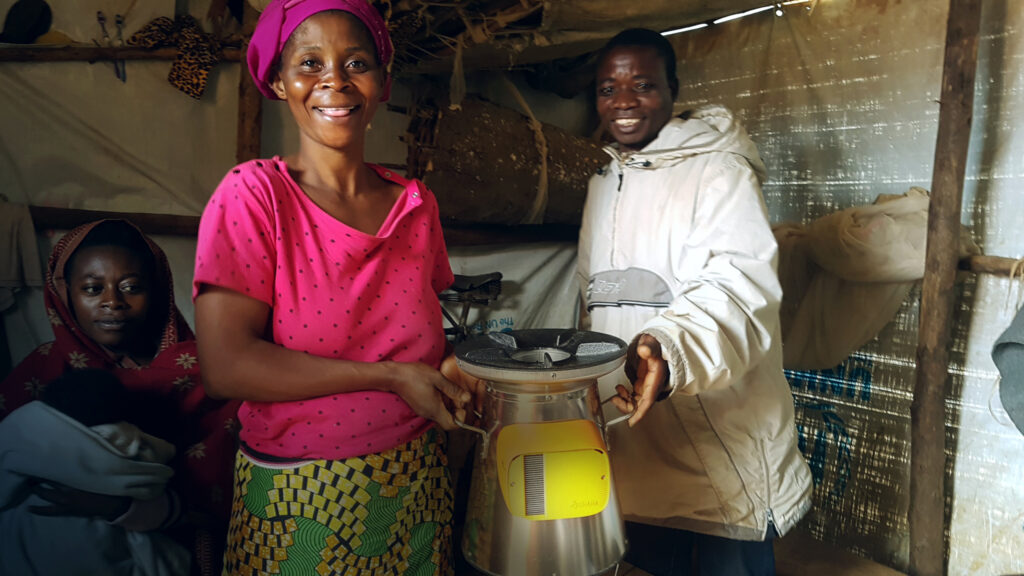
Nearly 3 billion people globally still use cookstoves that pose severe health risks.
In the Nakivale Refugee Settlement in southwest Uganda, home to the country’s oldest refugee settlement, you will find the Bambula — a cookstove that costs 5,000 Ugandan shillings, the equivalent of ~$1.30 USD. The Bambula, which is made from iron or mud and uses charcoal or wood as fuel, is one of the most common tools for daily cooking in the settlement.
Unfortunately, the traditional iron or mud Bambula cookstove poses severe health risks attributed to household air pollution such as pneumonia, stroke, heart disease, pulmonary disease, and lung cancer. These health risks are especially dangerous to women who spend a significant amount of their time cooking indoors. In addition to being dangerous and highly inefficient, the stoves are not durable. Still, it is estimated that 2.8 billion people globally cook with this type of cookstove and the polluting fuels that power them. The World Bank estimates the adverse impacts of polluting cookstoves cost the world more than $2.4 trillion each year across categories of health ($1.4 trillion per year), the climate ($200 billion per year), and the effect on women from lost productivity ($800 billion per year).

(Left) Abraham holding the ‘Bambula’ cookstove
(Right) Bahati holding the newly received BioLite “Home Stove”Cooking is one aspect of daily life residents of Nakivale have to contend with, often getting creative to develop a system that meets their needs given the scarce and unreliable resources. The fuel cost is a top consideration along with balancing other energy needs – such as charging a phone and providing electricity for one’s home.
From secure housing, reliable energy, clean and accessible water, and meeting necessary basic human needs – InnovationStudio’s Beyond Place Studio is working with Nakivale residents on the village pilot project. The project’s aim is to imagine a resettlement model that not only meets people’s basic needs but provides dignified shelter, vibrant public spaces and improved access to critical resources. Experimenting with local materials and new building methods, and applying emerging technologies for water delivery systems are all part of the Studio’s approach to refugee-led innovation. Recently the Studio worked with BioLite, a social enterprise that develops, manufactures, and distributes advanced clean energy technologies to off-grid households around the world, to test new types of cookstoves with Nakivale residents aimed at providing an improved cooking experience.
BioLite’s patented ‘Direct Conduction Thermoelectric System’ allows users to charge their phone while cooking and reduces smoke emissions by 90%.
BioLite currently operates in the East Africa region with established supply chains in Uganda and retail partners that sell BioLite products locally. In late 2020, InnovationStudio’s Beyond Place Studio and Opportunigee provided BioLite cookstoves to a range of residents in Nakivale to learn firsthand what these types of cookstoves could offer. Well aware of the adverse health effects of cooking indoors with traditional cookstoves, the goal of the user testing was to equip people in Nakivale with safer and high-efficient cookstove models and to better understand how such a product could fit into their lifestyles and habits. Learnings from the user testing will inform the approach that Beyond Place Studio takes in designing homes for the village pilot project.
The cookstove dilemma does not have a simple solution. Advancements in high-efficiency cookstove technology are important in solving the global need to improve household cooking practices. In addition, considerations of fuel accessibility and affordability, awareness of health impacts, convenience, and established cooking habits will be crucial for the uptake of clean cooking.
BioLite manufactures two cookstoves designed for off-grid and low-income households. The ‘HomeStove’ by BioLite is an ultra-clean biomass stove that generates electricity. The stove is designed to get as close to ‘clean fuel’ as possible while still using wood as the energy source. The ‘HomeStove’ utilizes BioLite’s patented ‘Direct Conduction Thermoelectric System’ technology to reduce smoke emissions by 90% and improve fuel consumption by 50% compared with traditional cookstove efficiency. In the ‘Homestove’, the heat from the flame is converted into electricity which powers a small internal fan that feeds oxygen into the flame eliminating the smoke. The technology not only reduces smoke emissions but also co-generates electricity from the flame to provide power to charge mobile phones via a USB port located on the side of the stove.
The second cookstove product developed and distributed by BioLite is the ‘Jiko Malikia’ charcoal stove. The stove was built to offer the highest fuel savings, greatest durability, and the largest cooktop on the market. Advanced combustion technology on the ‘Jiko Malikia’ reduces the smoke created from the stove by 75% as compared to average charcoal stoves. In many cases, the BioLite stove can cut fuel costs for consumers by half.
Both cookstoves are considered modern, clean, and improved by global standards and provide significant reductions in cooking emissions and fuel demands.
The average amount spent on charcoal fuel is $12 per month, with BioLite cookstoves people saved 50% on fuel costs. These fuel cost savings add up to the total cost of the stove within a year.
The BioLite cookstoves were purchased from the local distributor in Uganda, ensuring the Beyond Place Studio could evaluate the end-to-end process and feasibility of purchasing and deploying the products in Nakivale. The ‘Home Stove’ retails for $49 USD per stove and the ‘Jiko Malikia’ $65 USD per stove. Each product was sold by a different distributor, each came with customer service support and training upon purchase.
In user testing of the BioLite cookstoves there was an emphasis on ensuring diversity of representation within the user group across factors including country of origin, gender, family composition/size, location within the settlement, and duration living in the Nakivale Refugee Settlement. Each person was given an overview of the stove and its specific features by Opportunigee team members William and Rolande who were trained by the local BioLite distributors.
In these initial interactions, Rolande and William learned that most people pay between $1.30 USD – $13 USD for a homemade stove or a locally purchased stove. Nearly all participants shared that they normally cook indoors and only on occasion outdoors. Depending on family size, the price of charcoal as a fuel source on average was $12 per month. People who use wood as fuel tend to forage for it at no financial cost but with increasing scarcity and environmental impacts. Using biomass fuel such as wood and charcoal is still not optimal because of the correlated health risks and environmental effects.

The BioLite cookstoves were well received and those who used the cookstoves provided helpful feedback on product features and additional capabilities they’d hope to see. Regarding efficiency, most testers were impressed with the speed at which the cookstoves were able to cook the food – which saved time and money in fuel. The average amount of money spent on charcoal fuel before the BioLite cookstoves was $12 per month, after using the cookstoves people saved 50% on fuel costs. These fuel cost savings would add up to the total cost of the stove within a year. Each person was asked the amount they would be willing to pay for the stove; answers ranged from $13 to $54 USD. In regards to fuel, many people shared there was a barrier to access fuel due to the cost of charcoal or difficulty in sourcing wood.
Participants remarked on the ability of the stoves to produce little smoke. In regards to the design of the stove, many people stated it was well made. On future product features, several users wished there was an alternative to the wood and charcoal fuel used – some mentioning the desire to cook with gas. Several people commented on the cooking time to charge ratio of the ‘Home Stove’ – which offers considerations on potential improvements of the USB port for BioLite. Participants found an opportunity to ‘hack’ the stoves; for example, one person found removing the fuel feeding tray of the charcoal stove improved cooking times. Another participant commented on the durability of the handles of the charcoal stove – as six months after use of the stove the handles were worn out
After visiting participants six months after they were provided with BioLite cookstoves, it was found that each person was using their old inefficient cookstoves alongside the new cookstove, a term known as ‘stacking.’ This finding underscores one of the challenges of the global effort to reduce harmful cooking practices – even when people are provided with alternative technologies they still continue to use traditional cooking methods, even if shown to be harmful.
The choice of fuel is one of the biggest challenges that emerged from the product testing, six months after residents received the first stoves, they continue to share the stresses of fuel cost for charcoal and difficulty in finding wood for their daily cooking. An ideal progression of cookstove innovation would be the use of renewable fuel such as biogas, solar or electric cooking-based products; a move towards high-efficiency stoves that reduce emissions is an important next step towards this future state.

“The way of measuring the fire is fabulous, it has no smoke and saves fuel” – Giselle
Giselle Ntakwinja, originally from the Democratic Republic of Congo, received the ‘Jiko Malikia’ charcoal stove and shared “the way of measuring the fire is fabulous, it has no smoke and saves fuel.” She usually uses two sacks of charcoal per month for her cooking needs but with the new cookstove only uses one. She mostly cooks inside the home but twice a week cooks outside in the evening to feel the cool air. In the future, Giselle would like to have an oven to better provide for her growing family.

Almost everyone involved in the user testing at Nakivale cooks inside their homes. This revelation confirmed the need for the Beyond Place Studio to consider indoor ventilation as part of the design of homes for the village pilot project. Additionally, after the initial product testing, there are several questions to consider for the Studio’s village pilot including how the adoption of high efficient clean cookstoves can be incorporated and how to address ‘stacking’ and the continued use of inefficient and harmful cookstoves.
The product testing informed how much people would be willing to pay for a high efficient cookstove and that both fuel costs and fuel type needs consideration. It is worth noting that most people cooked a standard provision of food each week, most of which was locally grown or purchased or came from food aid. The choice of fuel is one of the biggest challenges that emerged from the product testing, six months after residents received the first stoves, they continue to share the stresses of fuel cost for charcoal and difficulty finding wood for their daily cooking. An ideal progression of cookstove innovation would be using renewable fuel such as biogas, solar or electric cooking-based products. A move towards high-efficiency stoves that reduce emissions is an essential next step towards this future state.
BioLite gleaned several insights from the field test that may inform future product development. The testing also provided BioLite with additional information about the timing of their supply chain in Uganda and further validation of the effectiveness of their cookstove products in refugee settlement settings. Additionally, user testing reinforced the Studio’s commitment to human-centered design as a means to move beyond shelter to creating dignified homes and vibrant public spaces in partnership with refugees.
The advancement, dissemination, and uptake of clean cooking technology is necessary to meet the needs of the 2.8 billion people worldwide who continue to be negatively impacted by using polluting fuels and technology.
As we look to apply new technologies to the challenges of cookstoves, it will be imperative to keep in mind that multiple factors influence the sustained use of clean energy for cooking. There has been significant attention given to this issue over the last ten years, from an increase in new alliances, global policy frameworks, and social enterprises focused on developing new cookstove technology, delivery systems, and addressing community and behavior aspects to cooking. Recent studies suggest that many energy-poor households desired alternatives to traditional stoves and improved cookstoves can benefit users of the medium and long term if they are durable and well adapted to their cooking needs.
InnovationStudio’s Beyond Place Studio is committed to supporting the advancement of clean cooking technology through local and global partnerships and finding opportunities for the InnovationStudio community to collaborate with our partners in the Nakivale Refugee Settlement. The advancement, dissemination, and uptake of clean cooking technology is necessary to meet the needs of the 2.8 billion people worldwide who continue to be negatively impacted by using polluting fuels and technology.

About
InnovationStudio’s Beyond Place Studio is collaborating with the refugee-led organization Opportunigee to design and build a ‘village pilot’ project which will house 500 recently resettled refugees in the Nakivale Refugee Settlement in Uganda. Opportunigee, an entrepreneurship hub was co-founded by two brothers, refugees from the Democractic Republic of Congo. The organization addresses the lack of refugee-led entrepreneurship, design and spaces in Nakivale. They provide entrepreneurial education, prototyping opportunities, masonry and mentorship for refugees, known as ‘Opportunigee scholars’. The ‘village pilot’ project aims to integrate innovations and technology that increase access to critical resources while also co-creating dignified housing and vibrant public spaces — with a goal of establishing improved models of resettlement. Innovation Studio applies transformative technology to things that matter and partners with organizations that are making an impact on the world’s biggest challenges.




